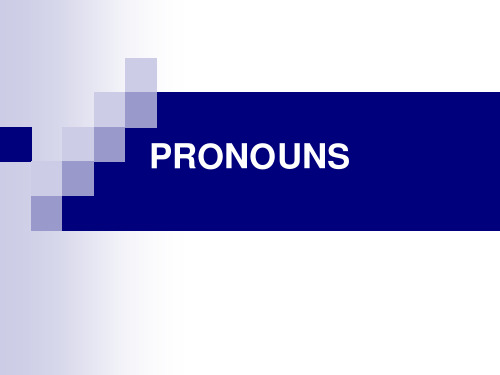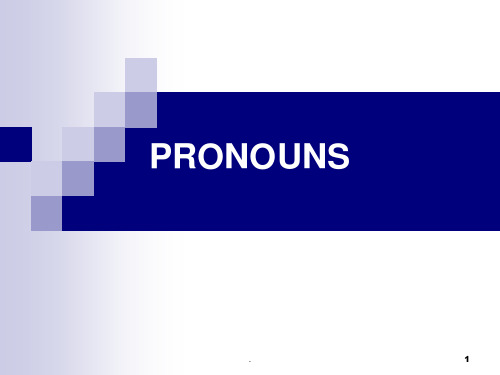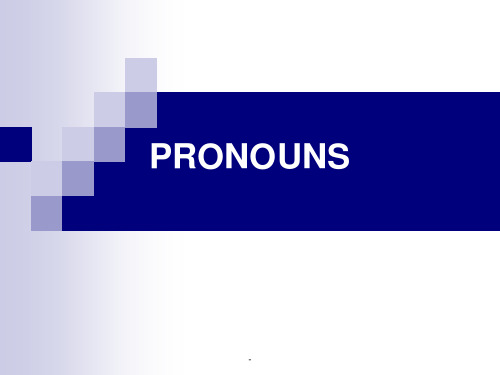新编英语语法教程PronounsPPT课件
合集下载
新编英语语法教程Pronouns

Personal pronouns:
I/ me, we/ us, you, he/ him, she/ her, it,
they/ them
Possessive pronouns:
my/ mine, our/ ours, you/ yours, his/
his, her/ hers, its/ its, their/ theirs
subjective case -------subject position objective case ------ other positions
2. minor sentence 3. everybody/ nobody + but/ except +
pronouns
Informality
Reflexive pronouns:
Reciprocal pronouns:
each other(‘s), one another(‘s)
Demonstrative pronouns:
this, that, these, those, it, such, same
This book is yours, and that is mine.
other night.
Concord in number
NUMBER: Antecedent: everyone, anyone, everybody,
anybody, no one, nobody, someone, somebody Pronoun?
The cast is giving ___ (its, their) bester, either.
I have do much work this morning.
英语语法讲解-代词

2) 先行项为某些并列结构时代词的选择: 根据该并列结构的单、复数意义来决定代词以 及相应限定词的单、复数形式: My friend and roommate has agreed to lend me his car. My friend and my roommate have agreed to lend me their cars.
代词及其先行项的“性”的一致: 阳性masculine gender—man, father, son, husband 阴性feminine gender—woman, mother, daughter, wife 中性neutral gender—book, desk, ship, car 通性common gender—student, teacher, doctor, infant 现代英语的代词体系包含了“性”的标记:单 数第三人称代词、物主代词、反身代词以及相 应的限定词。使用时要与先行项保持“性”的 一致。
注意: 1. 先行项为every-, some-等复合词时代词的选择: 1) 当先行词为 everyone, everybody, no one, nobody, anyone, anybody, someone, somebody 等复合词时,代词及相应的限定词通常按照语法一致原则用单数形式。 Anybody can attend the meeting if he is interested. Everybody talked at the top of his voice. If anyone calls, tell him I’ll be back later. 但是,非正式语体中,也可以根据意义一致的原则,用复数代词: Someone left their umbrella behind yesterday. Would they please collect it from the office? If anybody wants to give their name for the trip to Scotland, will they please do it before lunchtime? No one could have blamed themselves for that. 尤其当先行项为everybody, everyone时,其后用复数代词还比较自然。 Everyone was clapping their hands. Did everybody leave the dance early because they weren’t enjoying themselves? 当先行项为everything, anything, something, nothing时,随后的代词以及相应的 限定词一般只按语法一致原则用单数形式: Anything on the table can be thrown away, can’t it?
新编英语语法教程PronounsPPT课件

If a student needs advice about careers, ___should consult the career officers.
.
13
baby
When bathing a baby, always hold___ securely. My baby has got ___ first tooth.
.
14
Nouns of neuter gender
Normally: it, its, itself, they, them, their, themselves ? his, he, him, she, her, etc. Once upon a time there was a wolf in sheep’s clothing,
see Exercise 8C
.
11
Concord in gender
GENDER?
masculine, feminine, neuter, common
It is a set of grammatical forms of nouns (pronouns), determiners and adjectives that tell of the distinctions of sex or attribute.
PRONOUNS
.
1
1. classification 2. concord 3. case forms 4. reflexive pronouns
.
2
Pronoun?
pro- ? a. supporting or approving of something. b. doing something instead of someone.
.
13
baby
When bathing a baby, always hold___ securely. My baby has got ___ first tooth.
.
14
Nouns of neuter gender
Normally: it, its, itself, they, them, their, themselves ? his, he, him, she, her, etc. Once upon a time there was a wolf in sheep’s clothing,
see Exercise 8C
.
11
Concord in gender
GENDER?
masculine, feminine, neuter, common
It is a set of grammatical forms of nouns (pronouns), determiners and adjectives that tell of the distinctions of sex or attribute.
PRONOUNS
.
1
1. classification 2. concord 3. case forms 4. reflexive pronouns
.
2
Pronoun?
pro- ? a. supporting or approving of something. b. doing something instead of someone.
新编英语语法教程讲ppt演示文稿

.
.
.
.
(2)可以计数的集体名词:有单、复数形式和单复数意义;将其视为 一个整体时,用作单数;强调构成集体的成员时,用作复数。 例如: p. 46 中页
b) Number forms of the material 例如: (p. 46中页)
不可计数 sand 沙 water 水 food 食物 coffee 咖啡 rubber 橡胶 stone 石头 egg 蛋渍 lamb 羔羊肉 onion 洋葱味
Ander, China, The People’s Congress, the New York Times, the Democratic Party
a car, a family
two cars, many families
物质名词、抽象名词、和 sand, water, coffee, 专有名词通常是不可计数 failure, knowledge 的名词
表示同一类人或物,以及 抽象概念的名词
boy, house, tiger family, team, cattle, police air, snow, bread, rice
glory, honesty, education
表示人、国家、地方、机 构、组织等的专有名称
可以计数的个体名词和集 体名词,称为可数名词
II. Number forms of nouns
1. Regular and irregular plural a) Regular plural (p.p. 42-44) b) Irregular plural (p.p. 44-45)
2. Number forms of the collective, material, abstract
新编英语语法教程PPT课件

Modifier
a word or phrase that describes or limits the meaning of another word in a sense
Sense and voice
Sense
indicates when an action or state occurs (past, present, or future)
Introduce clauses that modify nouns or pronouns (e.g., "who," "which," "that")
Used to ask questions about nouns or pronouns (e.g., "who," "what," "which")
Voice
indicates which subject of the presence performs the action (active voice) or receives the action (passive voice)
Subjunctive mood
Subjunctive mood
03 Nouns and Pronouns
Types and Usage of Nouns
Generic names for people, places, or things (e.g., "dog,"
"city")
Co mm on No uns
Refer to ideas, concepts, or qualities
Background
a word or phrase that describes or limits the meaning of another word in a sense
Sense and voice
Sense
indicates when an action or state occurs (past, present, or future)
Introduce clauses that modify nouns or pronouns (e.g., "who," "which," "that")
Used to ask questions about nouns or pronouns (e.g., "who," "what," "which")
Voice
indicates which subject of the presence performs the action (active voice) or receives the action (passive voice)
Subjunctive mood
Subjunctive mood
03 Nouns and Pronouns
Types and Usage of Nouns
Generic names for people, places, or things (e.g., "dog,"
"city")
Co mm on No uns
Refer to ideas, concepts, or qualities
Background
新编英语语法教程Pronounsppt

Pronouns are words used instead of nouns, thus have nominal functions.
-
Classification
personal, possessive, reflexive, reciprocal, demonstrative, interrogative, relative, indefinite pronouns.
Personal pronouns:
I/ me, we/ us, you, he/ him, she/ her, it,
they/ them
-
Possessive pronouns:
my/ mine, our/ ours, you/ yours, his/
his, her/ hers, its/ its, their/ theirs
-
Concord in person
When it comes to making a conscious effort to help keep a public place clean, most people just don’t make the effort. I’m a maintenance man for a department store. If you did make the effort help keep the public place where I work clean, we probably wouldn’t have a job.
PRONOUNS
-
1. classification 2. concord 3. case forms 4. reflexive pronouns
-
Classification
personal, possessive, reflexive, reciprocal, demonstrative, interrogative, relative, indefinite pronouns.
Personal pronouns:
I/ me, we/ us, you, he/ him, she/ her, it,
they/ them
-
Possessive pronouns:
my/ mine, our/ ours, you/ yours, his/
his, her/ hers, its/ its, their/ theirs
-
Concord in person
When it comes to making a conscious effort to help keep a public place clean, most people just don’t make the effort. I’m a maintenance man for a department store. If you did make the effort help keep the public place where I work clean, we probably wouldn’t have a job.
PRONOUNS
-
1. classification 2. concord 3. case forms 4. reflexive pronouns
全英文英语语法课件,人称代词,物主代词讲解
III. Personal pronouns
1. Definition The words I, you, he, she, it, we and they are called personal pronouns.
2. We have both subject and object pronouns
指示代词
Reflexive pronouns
反身代词
II. pronouns Definition
1. Definition Pronouns are words we use in the place of a full noun.
Difficult to remember
He
Fox Iverumo Maldini
English Grammar
Pronouns
I. General outline of Pronouns
Personal pronouns
人称代词
pronouns (pron.)
Possessive adjectives & pronouns
物主代词(形容词性和名词)
Demonstrative pronouns
4) . Three groups of pronouns:
First person: the person speaking is called the first person. Second person: the person spoken is called the second person. Third person: the person(or animal, thing) spoken about is called
PronounsPPT课件
- Caswell pulled me to the hotel bar room and yelled for a waiter. We ordered drinks. While we drank, he talked continuously about himself, his family, his wife and her family.
Pronouns
1. Pronoun Reference (代词照应)
A. Personal Reference 人称照应
Demonstrative Reference 指示照应
-Crime author Agatha Christie wrote a lot of books and plays in her lifetime. They are still selling very well today, over thirty years after her death.
is when you (we) will enter elementary
school. In school, the child (we are) is no
longer “Mommy’s darling.” You (We) now
have to prove yourself (oursleves) to the
other children and also to your (our) teacher.
-
6
❖ If one (we seem) seems different from the other students, they (we) are treated differently, and these differences could be anything: pants, shoes, speech, religion, and so forth. It (They) really doesn’t matter. Yet right from the start, you (we) think that as long as you (we) are different, there is something wrong with you (us).
新编英语语法教程ppt课件
see Exercise 8C
11
Concord in gender
GENDER? masculine, feminine, neuter, common It is a set of grammatical forms of nouns
Dictatorship is the one of many evils which __(tend, tends) to perpetuate __(itself, themselves).
Either John or James, who are twins, __(have, has) left (his, their) sweater.
Pronouns are words used instead of nouns, thus have nominal functions.
3
Classification
personal, possessive, reflexive, reciprocal, demonstrative, interrogative, relative, indefinite pronouns.
Everyone thinks ____ (he is, they are )the centre of the universe.
Wells is one of the editors who always __(take, takes) a leading role in ____(his, their) community.
pronouns. One must remember to remain very still when he
attends a concert. Professor Smith and I went to the States together. We
《新编英语语法教程》PPT课件
新编英语语法教程
2021/6/20
1
Lecture 30 Coordination了
A coordinate construction is a sequence of semantically-related grammatical units that are similar in a form, equal in rank of
❖ One more boot, and I’ll have a pair.
❖ 如并列分句均为祈使句,第一句仍可表条件,第二句表结果:
❖ Surrender and live; resist and die. ❖ = If you surrender, you’ll live; … ❖ Don’t drink and drive. ❖ = If you don’t drink, you can drive. Or: ❖ If you drink, you can’t drive. 不许酒后开车。
❖ He is good and hungry. (very, extremely.)
❖ You’re all nice and hardworking.
2021/6/20
8
❖ And前的修饰后面的,表示程度,限于少数表性 质和程度的形容词和副词。最典型的是 nice and good.还有:
2021/6/20
16
❖ Or-group coordinators: or, either…or…
❖ 在否定句中,一般用 or 不用 and 连接同等成分。Or 一 般不表示所择关系:
❖ He has no money or food. ❖ = He has neither money nor food. ❖ I didn’t find him clever or good-looking. ❖ = I found him neither clever nor…. ❖ A sheep was not moving about or eating grass like the
2021/6/20
1
Lecture 30 Coordination了
A coordinate construction is a sequence of semantically-related grammatical units that are similar in a form, equal in rank of
❖ One more boot, and I’ll have a pair.
❖ 如并列分句均为祈使句,第一句仍可表条件,第二句表结果:
❖ Surrender and live; resist and die. ❖ = If you surrender, you’ll live; … ❖ Don’t drink and drive. ❖ = If you don’t drink, you can drive. Or: ❖ If you drink, you can’t drive. 不许酒后开车。
❖ He is good and hungry. (very, extremely.)
❖ You’re all nice and hardworking.
2021/6/20
8
❖ And前的修饰后面的,表示程度,限于少数表性 质和程度的形容词和副词。最典型的是 nice and good.还有:
2021/6/20
16
❖ Or-group coordinators: or, either…or…
❖ 在否定句中,一般用 or 不用 and 连接同等成分。Or 一 般不表示所择关系:
❖ He has no money or food. ❖ = He has neither money nor food. ❖ I didn’t find him clever or good-looking. ❖ = I found him neither clever nor…. ❖ A sheep was not moving about or eating grass like the
- 1、下载文档前请自行甄别文档内容的完整性,平台不提供额外的编辑、内容补充、找答案等附加服务。
- 2、"仅部分预览"的文档,不可在线预览部分如存在完整性等问题,可反馈申请退款(可完整预览的文档不适用该条件!)。
- 3、如文档侵犯您的权益,请联系客服反馈,我们会尽快为您处理(人工客服工作时间:9:00-18:30)。
Either John or James, who are twins, __(have, has) left (his, their) swerd in person
When it comes to making a conscious effort to help keep a public place clean, most people just don’t make the effort. I’m a maintenance man for a department store. If you did make the effort help keep the public place where I work clean, we probably wouldn’t have a job.
Wells is one of the editors who always __(take, takes) a leading role in ____(his, their) community.
Dictatorship is the one of many evils which __(tend, tends) to perpetuate __(itself, themselves).
see Exercise 8C
.
11
Concord in gender
GENDER?
masculine, feminine, neuter, common
It is a set of grammatical forms of nouns (pronouns), determiners and adjectives that tell of the distinctions of sex or attribute.
a word, phrase or sentence that is represented by pronouns.
One must remember to remain very still when he attends a concert.
Professor Smith and I went to the States together. We stayed there for three weeks.
Reflexive pronouns:
Reciprocal pronouns:
each other(‘s), one another(‘s)
.
5
Demonstrative pronouns:
this, that, these, those, it, such, same
This book is yours, and that is mine.
Personal pronouns:
I/ me, we/ us, you, he/ him, she/ her, it,
they/ them
.
4
Possessive pronouns:
my/ mine, our/ ours, you/ yours, his/
his, her/ hers, its/ its, their/ theirs
some, something, somebody,
someone; any, anything, anybody, anyone; no,
nothing, nobody, no one, none; everything,
everybody, everyone, each; much, many, little,
Interrogative pronouns:
what
who(ever), whom(ever), whose, which,
Relative pronouns:
that, as
who(ever), whom(ever), whose, which,
.
6
Indefinite pronouns:
I recognized one of the girls, but I didn’t speak to her.
I recognized one of the girls who were caroling the other night.
.
8
Concord in number
NUMBER: Antecedent: everyone, anyone, everybody,
anybody, no one, nobody, someone, somebody Pronoun?
.
9
The cast is giving ___ (its, their) best performance tonight.
Everyone thinks ____ (he is, they are )the centre of the universe.
Pronouns are words used instead of nouns, thus have nominal functions.
.
3
Classification
personal, possessive, reflexive, reciprocal, demonstrative, interrogative, relative, indefinite pronouns.
a little, few, a few, other, another, all, one, both,
neither, either.
I have do much work this morning.
He has done much for his wife.
.
7
Concord
ANTECEDENT
PRONOUNS
.
1
1. classification 2. concord 3. case forms 4. reflexive pronouns
.
2
Pronoun?
pro- ? a. supporting or approving of something. b. doing something instead of someone.
When it comes to making a conscious effort to help keep a public place clean, most people just don’t make the effort. I’m a maintenance man for a department store. If you did make the effort help keep the public place where I work clean, we probably wouldn’t have a job.
Wells is one of the editors who always __(take, takes) a leading role in ____(his, their) community.
Dictatorship is the one of many evils which __(tend, tends) to perpetuate __(itself, themselves).
see Exercise 8C
.
11
Concord in gender
GENDER?
masculine, feminine, neuter, common
It is a set of grammatical forms of nouns (pronouns), determiners and adjectives that tell of the distinctions of sex or attribute.
a word, phrase or sentence that is represented by pronouns.
One must remember to remain very still when he attends a concert.
Professor Smith and I went to the States together. We stayed there for three weeks.
Reflexive pronouns:
Reciprocal pronouns:
each other(‘s), one another(‘s)
.
5
Demonstrative pronouns:
this, that, these, those, it, such, same
This book is yours, and that is mine.
Personal pronouns:
I/ me, we/ us, you, he/ him, she/ her, it,
they/ them
.
4
Possessive pronouns:
my/ mine, our/ ours, you/ yours, his/
his, her/ hers, its/ its, their/ theirs
some, something, somebody,
someone; any, anything, anybody, anyone; no,
nothing, nobody, no one, none; everything,
everybody, everyone, each; much, many, little,
Interrogative pronouns:
what
who(ever), whom(ever), whose, which,
Relative pronouns:
that, as
who(ever), whom(ever), whose, which,
.
6
Indefinite pronouns:
I recognized one of the girls, but I didn’t speak to her.
I recognized one of the girls who were caroling the other night.
.
8
Concord in number
NUMBER: Antecedent: everyone, anyone, everybody,
anybody, no one, nobody, someone, somebody Pronoun?
.
9
The cast is giving ___ (its, their) best performance tonight.
Everyone thinks ____ (he is, they are )the centre of the universe.
Pronouns are words used instead of nouns, thus have nominal functions.
.
3
Classification
personal, possessive, reflexive, reciprocal, demonstrative, interrogative, relative, indefinite pronouns.
a little, few, a few, other, another, all, one, both,
neither, either.
I have do much work this morning.
He has done much for his wife.
.
7
Concord
ANTECEDENT
PRONOUNS
.
1
1. classification 2. concord 3. case forms 4. reflexive pronouns
.
2
Pronoun?
pro- ? a. supporting or approving of something. b. doing something instead of someone.
